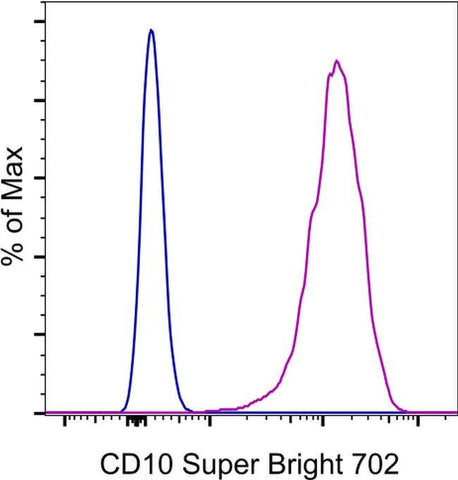
CD10 Monoclonal Antibody (eBioCB-CALLA (CB-CALLA)), Super Bright™ 702, eBioscience™
カートを見る または ショッピングを続ける
説明
PRODUCT DETAILS
Host: Mouse
Isotype: IgG2b, kappa
Clonality: Monoclonal
Clone: eBioCB-CALLA (CB-CALLA)
Format: Super Bright™ 702
Reactivity: Human
Application: Flow Cytometry
Tested Dilution: 5 µL (0.125 µg)/test
Concentration: 5 µL/Test
Storage: 4° C, store in dark, DO NOT FREEZE!
Formulation: PBS, pH 7.2, containing 0.09% sodium azide
Purification: Affinity chromatography
Data Sheet: TDS
Specific Information
Description: The eBioCB-CALLA monoclonal antibody recognizes human CD10 (CALLA, NEP, enkephalinase, Neprilysin), which is a 100 kDa, type II cell surface glycoprotein originally identified for its expression on most acute lymphoblastic leukemias (ALL). Subsequently, CD10 was shown to be the same molecule as the neutral endopeptidase (NEP), or KII-NA. CD10 is a Zn2+-dependent metallo-peptidase with endothelin, glucagon, gastrin, neurotensin and bradykinin included among its substrates. CD10 is involved in the regulation of chemotactic and inflammatory processes involving neutrophils. In B cells, CD10 regulates stromal cell-dependent B lymphopoiesis and expression has also been reported on mature B cells in germinal centres. In addition to the hematopoietic compartment, other major sites of CD10 expression are the brush border of enterocytes and renal tubules and glomeruli. There is partial blocking of the eBioCB-CALLA and MEM-78 monoclonal antibodies indicating that they recognize similar epitopes.
Applications Reported: This eBioCB-CALLA (CB-CALLA) antibody has been reported for use in flow cytometric analysis.
Applications Tested: This eBioCB-CALLA (CB-CALLA) antibody has been pre-titrated and tested by flow cytometric analysis of normal human peripheral blood cells. This can be used at 5 µL (0.125 µg) per test. A test is defined as the amount (µg) of antibody that will stain a cell sample in a final volume of 100 µL. Cell number should be determined empirically but can range from 10^5 to 10^8 cells/test.
Super Bright 702 is a tandem dye that can be excited with the violet laser line (405 nm) and emits at 702 nm. We recommend using a 710/50 bandpass filter. Please make sure that your instrument is capable of detecting this fluorochrome.
When using two or more Super Bright dye-conjugated antibodies in a staining panel, it is recommended to use Super Bright Complete Staining Buffer (Product # SB-4401) to minimize any non-specific polymer interactions. Please refer to the datasheet for Super Bright Staining Buffer for more information.
Light sensitivity: This tandem dye is sensitive to photo-induced oxidation. Protect this vial and stained samples from light.
Fixation: Samples can be stored in IC Fixation Buffer (cat. 00-8222) (100 µL of cell sample + 100 µL of IC Fixation Buffer) or 1-step Fix/Lyse Solution (cat. 00-5333) for up to 3 days in the dark at 4°C with minimal impact on brightness and FRET efficiency/compensation. Some generalizations regarding fluorophore performance after fixation can be made, but clone specific performance should be determined empirically.
Excitation: 405 nm; Emission: 702 nm; Laser: Violet Laser
Filtration: 0.2 µm post-manufacturing filtered.
Super Bright Polymer Dyes are sold under license from Becton, Dickinson and Company.
For Research Use Only. Not for use in diagnostic procedures. Not for resale without express authorization.
